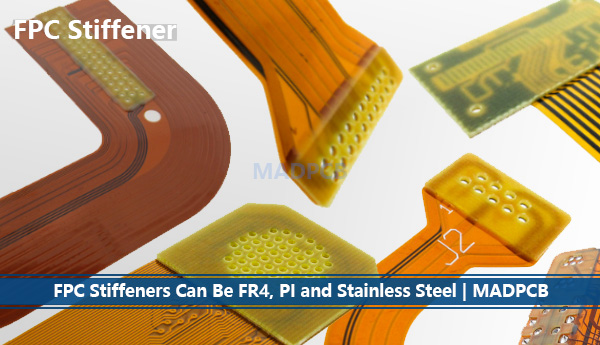Table of Contents
Stiffeners in FPC and Rigid-Flex PCB
Stiffeners are added to the flexible circuit as one of the final fabrication steps and can be applied with adhesive, PP or PSA. In flex circuits and rigid-flex boards, FPC stiffener is a common and important requirement, and they can be bonded on one or two sides of flexible areas. A stiffener is not an electrical piece, but a mechanical support or heat dissipation element, which has a significant impact on both the performance and reliability of the flexible printed circuits. While, not all flexible circuits require stiffeners.
In most designs, stiffeners are on the same side of a flex PCB, but sometimes, the stiffeners need to press to the both sides, as a result, it requires multiple lamination cycles, which will increase the cost and lead time. Besides, stiffeners need to be fully and accurately defined in Gerber file set, and stiffeners on top and bottom layers should be put in different mechanical layers.
FPC Stiffener Purposes
In flex PCB designs, stiffeners serve the following purposes.
- Rigidizing connector area for stress relief of large connectors or repeated insertions of the connector
- ZIF (Zero Insertion Force) thickness requirements
- Localized bend constraint(s)
- Forming a flat surface for the placement of SMT pads and components
- Minimizing component stress
- Managing heat dissipation with aluminum and stainless-steel stiffeners
- Replacing SMT carrier by making the panel rigid enough to pass SMT assembly
FPC Stiffener Materials
Typically, stiffeners in flexible PCB manufacturing are made up of Polyimide, FR-4, Aluminum and Stainless Steel. Selecting the right stiffener material is important since different stiffener has its benefits in different applications.
- Polyimide Stiffeners: Polyimide (PI) stiffeners are most commonly used under FPC gold fingers, which will be inserted into ZIF connector. Connector specifications define that the flexible circuit, at the exposed ZIF contact fingers, must be of a specific thickness to engage the connector reliably. The two most common ZIF finger thicknesses are 0.3mm and 0.2mmm. Of course, these thicknesses are with a tolerance, like 0.03mm or 0.05mm.
- FR-4 Stiffeners: FR-4 stiffeners are used to provide support to areas of a flex design that have components and/or connectors attached. The stiffeners present the flex circuit from being bent at or adjacent to the components or connectors. If not adding FR-4 stiffeners, it would most likely cause the solder joints to be cracked or compromised when bend the circuit board. When there are holes both on flex circuit and FR4 stiffener in the same positions and with same diameters, enlarging the stiffener holes (access holes) by 0.15mm each side is necessary for preventing for hole misalignment by manual bonding. FR-4 stiffener bonding process requires drilling, registration, and pre-tack of adhesive or prepreg.
- Aluminum and Stainless Steel Stiffeners: Aluminum and stainless steel are two main metal stiffeners, but need to customize with higher cost. As a result, metal stiffeners have significant cost higher and turnarounds longer than polyimide and FR-4 stiffeners. Aluminum is commonly used for heat dissipation, and stainless steel is commonly used when there is very limited space for stiffeners, but the design requires more component area support than what an equivalent thickness FR4 stiffener can provide. Aluminum stiffener bonding process requires drilling, milling, registration, and pre-stack of prepreg. Stainless steel stiffener bonding process requires drilling, laser cut, registration, and pre-stack of prepreg.
FPC Stiffener Thicknesses
Stiffeners can be Polyimide (PI), FR4, Stainless Steel and Aluminum in our flex circuit manufacturing, and each kind FPC stiffeners have various thicknesses for choice.
| Stiffener Material | Usual Thickness | Unusual Thickness |
| Polyimide (PI) |
0.05mm (2mil) 0.075mm (3mil) 0.1mm (4mil) 0.125mm (5mil) 0.15mm (6mil) |
0.175mm (7mil) 0.2mm (8mil) 0.25mm (10mil) 0.225mm (9mil) 0.25mm (10mil) 0.275mm (11mil) |
| FR-4 | 0.2mm (8mil) 0.3mm (12mil) 0.4mm (16mil) 0.5mm (20mil) 0.6mm (24mil) 0.7mm (28mil) 0.8mm (32mil) 1.0mm (39mil) 1.2mm (47mil) 1.5mm (59mil) |
0.9mm (35mil) 1.1mm (43mil) 1.3mm (51mil) 1.4mm (55mil) 1.6mm (63mil) |
| Aluminum | 0.2mm (8mil) 0.25mm (10mil) 0.3mm (12mil) 0.35mm (14mil) 0.4mm (16mil) 0.5mm (20mil) 1.5mm (59mil) |
0.15mm (6mil) 0.45mm (18mil) |
| Stainless Steel | 0.15mm (6mil) 0.2mm (8mil) |
– |

